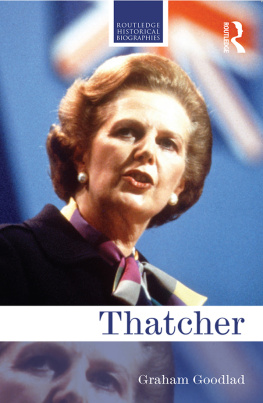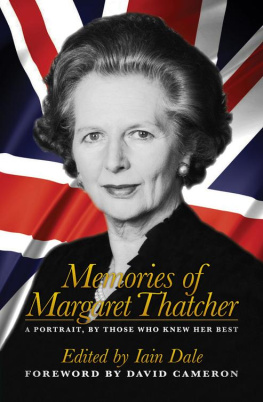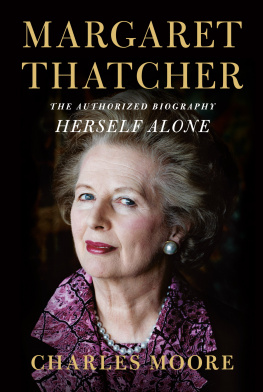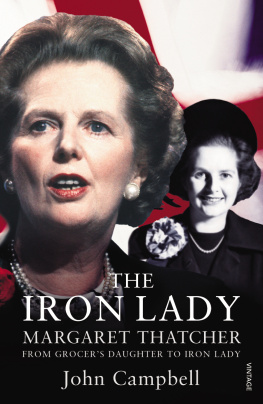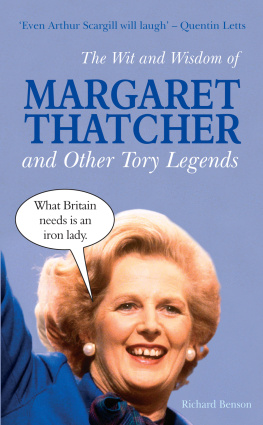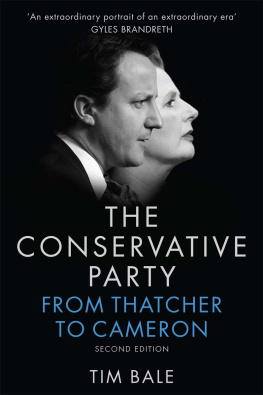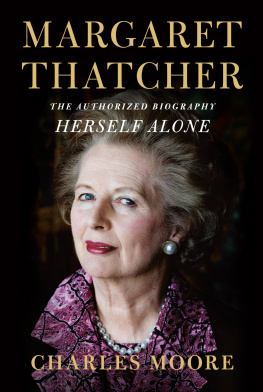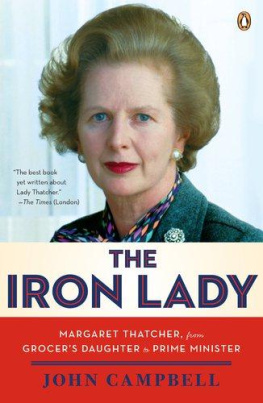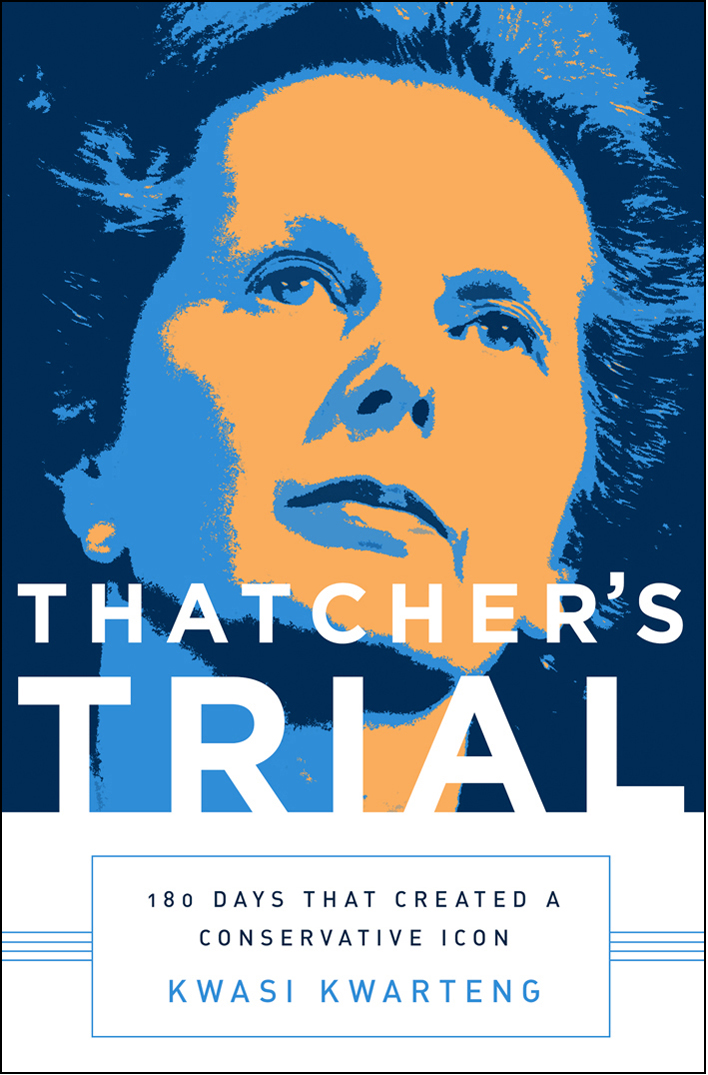
THATCHERS TRIAL
BY THE SAME AUTHOR
Ghosts of Empire
War and Gold

Copyright 2015 by Kwasi Kwarteng.
First published in 2015 in Great Britain by Bloomsbury Publishing, an imprint of Bloomsbury Publishing Plc.
Published in the United States by PublicAffairs, a Member of the Perseus Books Group All rights reserved.
Printed in the United States of America.
No part of this book may be reproduced in any manner whatsoever without written permission except in the case of brief quotations embodied in critical articles and reviews. For information, address PublicAffairs, 250 West 57th Street, 15th Floor, New York, NY 10107.
PublicAffairs books are available at special discounts for bulk purchases in the U.S. by corporations, institutions, and other organizations. For more information, please contact the Special Markets Department at the Perseus Books Group, 2300 Chestnut Street, Suite 200, Philadelphia, PA 19103, call (800) 810-4145, ext. 5000, or e-mail .
Typeset by Newgen Knowledge Works (P) Ltd., Chennai, India
The Library of Congress has cataloged the printed edition as follows: 2015949802
ISBN 978-1-61039-563-2 (EB)
First Edition
10 9 8 7 6 5 4 3 2 1
David English sees some similarity between his early struggles to establish the new Daily Mail and the trial of my Government during its first two years. Just as he kept his nerve, so we shall keep ours and win through.
Margaret Thatcher, 1 May 1981, at the Celebration Dinner on the occasion of the 10th Anniversary of the new Daily Mail at Claridges
Contents
Guide
Margaret Thatcher left Downing Street for the last time in November 1990. She remains, however, an international icon. At the height of her powers, she was one of the most famous women of her time. She was regarded as a formidable figure who seemed to transcend the traditional limitations of her gender. She projected immense authority and self-confidence and was also, in her home country at least, someone who polarised opinion. The left saw her as a divisive, callous, almost cruel figure who seemed to take relish in crushing her opponents. To her supporters, she was a national saviour, almost on a par with Sir Winston Churchill.
The Britain she came to lead in 1979 was a country which had lost confidence in its future. In fact, the whole of the 1970s themselves had been widely condemned in Britain. As one recent writer has put it, the seventies are two words that have won a million British political arguments. For Britain, since the Second World War the worst times came between the election of Edward Heath in 1970 and the election of Margaret Thatcher in 1979.
Although revisionists have tried to reclaim the 1970s as a decade of possibility and growing consumerism, the decade still remains one which marks a low point in Britains fortunes. Thatchers government and her supporters easily fostered the impression that Britain was heading towards inexorable decline. The feeling that Thatchers victory marked a beginning of hope stimulated many of her supporters.
Thatcher herself contributed to this sense of almost Messianic redemption. In her grandiose way, she declared, No theory of government was ever given a fairer test or a more prolonged experiment in a democratic country than democratic socialism received in Britain.
In Thatchers own mind, May 1979, when she was first elected Prime Minister, marked a decisive turning point in political history. The failure of democratic socialism could be seen in the streets, as rubbish piled up. The British disease of high inflation, enormous industrial unrest and economic inefficiency was something that was widely observed. David Cameron, who would later become Prime Minister, described the 1970s to Demos, a left-of-centre think tank, in 2006: Economic decline was embodied in inflation, stagnation and rising unemployment... deteriorating industrial relations: union verses management, workers versus the bosses.... In 1950, 1,389,000 working days were lost to industrial action. By 1979, this had multiplied to 29,400,074the highest on record. Margaret Thatcher set out to deal not only with the problems of this British disease but also with its causes.... With huge courage and perseverance, she turned Britain into a different country.
The greatest humiliation of the decade arguably occurred in 1976, when the International Monetary Fund organised a loan to bail out the Labour government. Their very arrival was seen as a moment of overwhelming disgrace, as though Britain were some Central American republic incapable of running its own finances. As the IMF delegates arrived in November to give the British government the terms of a loan, the mere fact that a British government was forced to submit to the dictates of international financial bureaucrats was a public relations disaster.
May 1979 was indeed a watershed. It was apparent even to people at the time that something new had happened. Newspaper editorials spoke of a policy sea change in which the focus on the state would be replaced by a new emphasis on the individual. It was also appreciated that Thatcher marked a break from the patrician Conservative leadership style represented by former Prime Ministers Macmillan, Eden and, to a lesser extent, Heath.
Of course, the most obvious difference was that she was a woman. Less obviously, as a consequence of her gender, Thatcher had not been initiated in the traditional breeding grounds of the Conservative establishment. Among post-war Conservative leaders, she was the only one, with the exception of Heath, not to have attended an exclusive, fee-paying school. And unlike Heath, she had not served in the Armed Forces and had absolutely no military experience.
As a woman, she was excluded from many of the social clubs, such as the St Jamess gentlemens clubs in the exclusive Mayfair area of London, which featured so prominently in senior Conservative politicians lives of that time.
Thatchers background was different in more subtle ways as well. Her father was a Methodist lay preacher. This religious background, as I will show, gave Thatchers thinking a particular intensity. As a leader, she constantly referred to her background as the daughter of a preacher. She infused her imagery with references to the Bible, in particular to the New Testament and parables.
Thatcher saw the world in basic, even simplistic terms. She saw the world as a series of conflicts between good and evil, between the free market and socialism, between people like us and enemies. This binary approach to life was at the core of her being, a Manichaean mindset that was, in many ways, the source of her conviction: belief and self-belief were wrapped tightly together.
Yet less than two years into her premiership, it appeared that her government would fail. By March 1981, unemployment had risen to 3 million, and public expenditure had increased, as had the public deficit. Within her own party, Thatchers position was insecure. Many of the leading lights of her party were precisely those patrician figuresold Etonians, landed gentry and wealthy figures from the world of businesswho had dominated the party since the end of the Second World War.
Thatchers Trial is the story of the six months, from March to September 1981, which defined Thatcher as a leader. She showed herself to be inflexible, tough-minded and courageous. Her judgements were clear, if sometimes wayward, and although her self-belief sometimes faltered, publicly she never let any hesitation blunt her message. She always conveyed an image of utter certainty, even when some of her closest allies openly expressed reservations. As Norman Fowler, a member of Thatchers first government, remembered, in 1981, we had one challenge after another.
Next page

